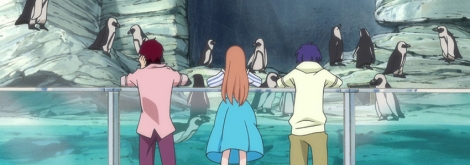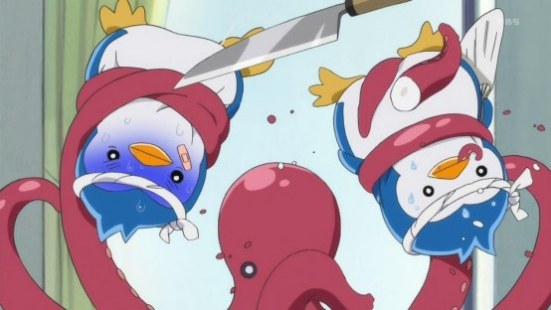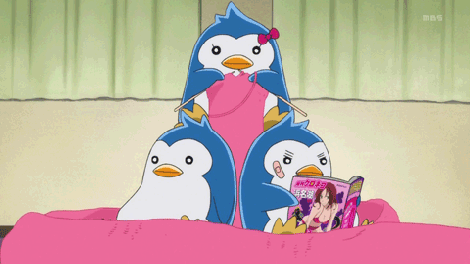So it’s in the title, and they’re always in the episodes, but even after watching the entire series one might come to the conclusion that the penguins are pretty insignificant to the story. To that I would agree to an extent, but in the end I would disagree wholeheartedly. To me, the penguins serve three main purposes (two of which are obvious and one is a bit more subtle). The first and most obvious function is to be background activity for any particular scene. Secondly, they reflect the characteristics of their owner on a micro-scale, and lastly is their thematic significance which I’ll get to at the end of this article.
The first purpose of the penguins is kind of the most superficial but perhaps the most appealing factor of their existence. Their quirky and random activities every episode help to keep the atmosphere light, even in the most tense of situations. We can have the characters having the most serious discussions, and then the penguins will just be looking at swimsuit magazines. I think my favorite penguin sequence involves their intense struggle against an octopus to turn it into takoyaki. These “skits” keep the pace of the series moving and makes long sequences of dialogue feel not so long. I also think a super hyper-analyst could probably derive hidden meanings within each of these scenes, but I personally don’t have the creativity for that task.
Next, we have the fact that the penguins take on the traits of their respective owners. For Number 1, he’s a player like Kanba. Well, I guess sexually aware pervert might be more accurate, since all Number 1 does is look at dirty magazines. Number 3 doesn’t like that very much either. Number 1 also always has a band aid on his cheek, which references the one Himari gave to Kanba on the day of his real parents’ funeral, symbolic of the hope she gave her as well as the love that he felt for her all this time.
Number 2 has the habit of eating. Pretty much any time he’s on screen, he’s either eating something or zapping cockroaches with bug spray. The reason he’s always eating is because Shouma was destined to starve to death in the cage, but Kanba saved his life by sharing the Penguindrum with him. So this constant eating serves a reminder of how Shouma was originally supposed to die. As for Number 3, she pretty much mirrors everything Himari does, like sewing or cooking. However, she also has the sad fate of mirroring Himari each time she dies, too. Whenever Himari is on the brink of death, Number 3 also begins to fade away.
Now the last purpose of the penguins happens to be their symbolic importance to the story. It wouldn’t quite be Mawaru Pengiundrum if everything didn’t have some sort of thematic significance, now would it? As a whole, birds are a prevalent symbol throughout the entire series. From Tabuki being a bird enthusiast to the penguins themselves, birds are pretty much everywhere. Ultimately, they represent freedom, whereas a caged bird represents imposition of fate and hopelessness to change one’s own destiny. The main reason Ringo shows any interest in birds at the start of the series is to attract Tabuki, hoping that it would fulfill the destiny written in her diary.
Penguins are birds too, in case for some reason you didn’t know. In a way, penguins are kind of like caged birds in that they can’t fly away and are therefore not really free to do what they want. But, evolution gave them an alternative which was the ability to swim. Evolution provided them with the survival strategy needed to challenge the fate that was imposed upon them (of course, I realize that isn’t exactly how real evolution works, but the analogy is passable on a poetic level). That’s why I think penguins were chosen as the animals to represent the Takakuras. Sure, they make cute mascots but there’s so much more to it on a subtextual level. Even if this wasn’t Ikuhara’s original intent, the hints are all still there and the symbolism is just too strong to ignore.
B.W.




Reblogged this on Just my guilty pleasure reblog..
I just finished watching Mawaru Penguindrum, and I was completely bemused. Thanks so much for these enlightening analyses! Do you plan to do more of them?
Yeah, I’d love to do some more of these! I just need to brush up on the anime before attempting another analysis.
Cool. I look forward to reading them!!
Im late to the party but in the same boat, thank you kind citizen.
I had no idea what the penguins meant. They were entertaining to watch though regardless.